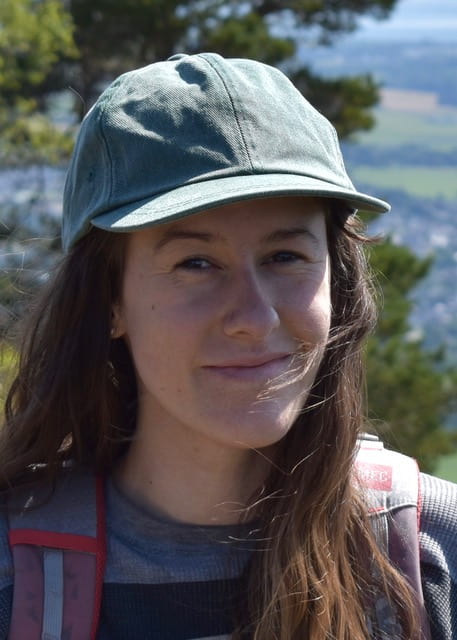Dr. Madhur Anand

Madhur Anand is a Full Professor in the School of Environmental Sciences at the University of Guelph. She is an award-winning ecologist with research interests ranging from theoretical to empirical studies of global ecological changes in ecosystems at regional and global scales and their implications for human-environment sustainability. She has collaborated with mathematicians, theoretical physicists, statisticians, computer scientists, geographers and poets. She served as Director of the Waterloo Institute for Complexity and Innovation from 2015-2018 and in 2019 was appointed the inaugural director of the Guelph Institute for Environmental Research, where she lead a number of interdisciplinary initiatives to help address our climate emergency and biodiversity crisis. She also serves on several national and international granting panels in both the arts and the sciences, on the Educational Review Committee of The Walrus, and on the board of directors of the rare Charitable Reserve. Dr. Anand is an award-winning author and poet, and all her books have been published by Penguin Random House Canada.
Jessica Guezen (PhD candidate)
My research examines how patterns of insect forest damage are linked to climate change. Using the functional traits of forest insects and their host trees, I hope to develop an index for predicting forest vulnerability to insect damage under climate change based on relationships between traits and climate variables. Given the magnitude of insect outbreaks as a current regulating factor for forests globally, identifying how climate change will impact this disturbance is essential if we hope to be able to preserve forest ecosystems in the future.


Marcelo Frangipani (PhD student)
My research investigates how community dynamics and human-environment interactions structure ecosystems by combining dynamical models with field data. Building on my expertise in food web and kelp forest resilience, I am studying conservation strategies that most quickly instill environmental mitigation in human societies. Examples range from the appropriate scale of agreements in climate change negotiations (i.e., regional or global agreements) to restoration efforts of individual ecosystems or populations, where human adaptation to degraded environmental regimes (e.g., building infrastructure or changing local economies) could limit the time windows over which restoration efforts enjoy widespread public participation.
Dr. Subhendu Paul (Postdoc)
Supporting a project focused on combining deep learning and the theory of tipping points to better predict droughts by helping in the building and testing of new models.
Research Assistants
Isaiah Farahbakhsh (MSc)
Liane Miedema Brown (PhD)
Recent alumni
Dr. Liane Miedema Brown (PhD). Mosaic: The Capacity of Multi-use Landscapes in Southern Ontario to Maintain Biodiversity and Ecosystem Service Delivery.
Dr. Milena Rosenfield (Postdoc). Measurements of ecosystem services across different ecosystem types in southern Ontario.
Dr. Vadim Karatayev (Postdoc). Community dynamics and human-environment interactions structure ecosystems by combining dynamical models with field data.
Dr. Anne-Sophie Lafuite (Postdoc). Advancements towards sustainability of human-environment systems, especially the conservation of biodiversity.
Dr. Virginia Capmourteres (PhD). Developing causal models to improve the assessment of ecosystem integrity and conservation value.
Rachel Dietrich (PhD). Examines how Ontario forests are responding to climate change.
Dr. Shane Nowack (Postdoc). Biodiversity optimization in landscape mosaic systems.
Dr. Shaik Hossain (Postdoc). Impact of climate change on managed and natural stands in North America.
Vivek Thampi (PhD). Modelling human-environment dynamics in coral reef populations.
Jo Pharon (PhD). Modelling human-environment dynamics in forest ecosystems.
Kathryn Fair (PhD). Spatially explicit modelling of human-environment interactions in a forest-grassland mosaic.
Arundhati Das (PhD). Modelling forest-grassland mosaics in India.
Kirsten Henderson (PhD). Modelling tree-grass interactions under human and environmental forces.
Sarah Rizvi (MSc). Developing national indicators for ecosystem sustainability.
Jihan Zihan (PhD): Hidden Markov modelling in forest dynamics (Co-supervised, Chinese Academy of Sciences)
Waseem Ashiq (PhD): Forest dynamics and climate change in Ontario, Canada.
Lyndsay Schram (MSc): Keystone structures in managed forests (Co-supervised with S. Newmaster, University of Guelph).
Robert Townsend (Undergrad NSERC USRA): Modelling forest dynamics.
Alice Cecile (Undergrad NSERC USRA): Statistical analysis of dendrochronological data.
Elizabeth Shapiro (Undergrad): Old growth red pine forest dynamics.
Yuxin Zhang (Visiting faculty member from Chinese Academy of Sciences) (Co-supervised with C.T. Bauch, Mathematics and Statistics, University of Waterloo).
Carolina Blanco (CNPq Postdoc): Modelling forest-grassland-human system.
Alison Traub (Undergrad NSERC CREATE FCM Scholarship): Dendrochronology as a tool for predicting range shifts in Pinus resinosa.
Veronica Chillo (PhD): Biodiversity and resilience of arid rangelands (Co-supervised with R.Ojeda University of Cordoba, Argentina).
Dr. Chris Pagnutti (NSERC PDF): Modelling forest transitions.
Stephen Gore (Undergrad NSERC USRA): Biodiversity of an old-growth forest.
Lee-Ann Barlow (Undergrad): Modelling invasive species in forests.
Chris Wagner (Undergrad NSERC USRA): Old-growth forest biodiversity.
Lucas Silva (PhD): Long-term vegetation dynamics across Americas: the implications of climate change for forest expansion and decline.
Fernando Joner (PhD): Assembly rules and plant traits in disturbed ecosystem (Co-supervised with V. de Patta Pillar, UFRGS Brazil).
Yuxin Zhang (PhD): Quantification and scaling of biodiversity in mountain forests (Co-supervised with K. Ma, Chinese Academy of Sciences).
Mark Leithead (PhD): Vegetation dynamics in North and South America: climate change, disturbance and gradients across spatiotemporal scales.
Dr. Jenn Babin-Fenske (PhD): Disturbance-mediated interactions between insects and forests:empirical and modelling studies.
Dr. Paul Caplat (PDF): Individual-based modelling of forest dynamics.
Clinton Innes (Undergrad): Modelling forest-grasslands and human behavior (Co-supervised with C. Bauch, Mathematics and Statistics).
Chris Jepson (Undergrad): Soil analyses for global change research.
Amy Vallarino (Undergrad): Paleoecological forest response to climate change.
Emily Mannella (Undergrad): Plant trait database for Northern Ontario.
Shelby White (Undergrad): Functional plant trait diversity in disturbed and retired forests.


